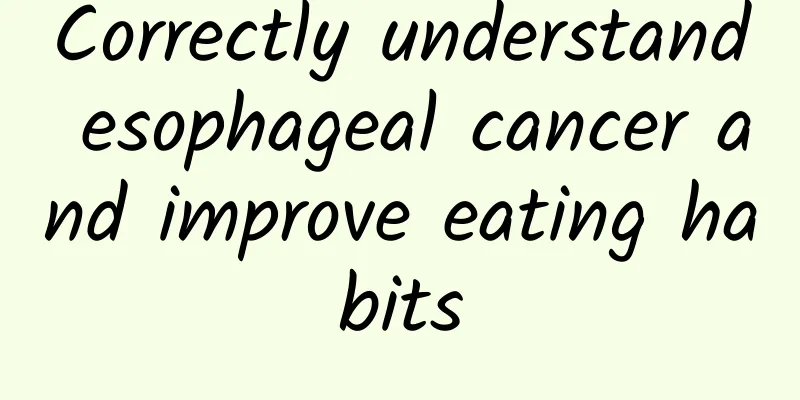Correctly understand esophageal cancer and improve eating habits

|
Esophageal cancer is a malignant tumor that occurs in the tissue of the hollow muscle tube (esophagus). It is a digestive tract tumor and its incidence rate ranks 8th in the world. The International Agency for Research on Cancer (IARC) under the World Health Organization (WHO) has issued a new warning: drinking hot drinks above 65°C increases the risk of esophageal cancer and has included hot drinks above 65°C in the list of Class 2A carcinogens. Grade 2A is second only to the highest grade 1 (clear carcinogenic risk). According to statistics published in The Lancet Gastroenterology & Hepatology, China accounts for nearly half of the global burden of esophageal cancer incidence and mortality. We know that food and liquids pass through the esophagus into the stomach, and esophageal cancer usually originates from the lining of the esophagus and grows outward. Over time, the tumor blocks the passage of food and liquids, making swallowing painful and difficult. Most patients are not diagnosed until the late stages of the disease. The incidence of esophageal cancer varies greatly in geography, race, and gender. The overall incidence is rising. In some areas of my country, esophageal cancer is even endemic, such as in the Taihang Mountains, Dabie Mountains, Nanchong, Yanting in Sichuan, and Lin County in Henan. | Causes and symptoms The exact cause of esophageal cancer is unknown, but many medical researchers believe that chronic irritation of the esophagus is a major cause. | Risk factors for esophageal cancer 1. Long-term smoking and drinking can increase the risk of esophageal cancer by 18%. For people who smoke one or two packs of cigarettes a day, this possibility increases to 44%. Smokeless tobacco also increases the risk of esophageal cancer. 2. Eating hot food frequently will increase the risk of cancer. Hot food will irritate the esophageal mucosal epithelium. After repeated stimulation, it will cause damage and form chronic inflammation. 3. A diet lacking in fruits, vegetables, zinc or other vitamins can also increase the risk of esophageal cancer. | Symptoms of Esophageal Cancer 1. Difficulty swallowing and the feeling of food getting stuck in the throat or chest are the most common symptoms. 2. A burning sensation or mild chest pressure is an often overlooked symptom of esophageal cancer. The above symptoms will progressively worsen. Long-term swallowing pain can lead to food regurgitation, weight loss, physical exhaustion and malnutrition. Most people think that if it does not affect their eating, they will not care about it. By the time the tumor becomes very large, the best treatment time has been missed and the patient can no longer be cured. Treatment for esophageal cancer depends on the stage of the disease and the patient's general health. If the cancer is in its early stages, it may be curable. Early detection and early treatment are important. To prevent esophageal cancer, you must develop a habit of paying attention to your lifestyle and diet. | Prevention of esophageal cancer 1. Change bad eating habits: The esophagus is lined with mucous membranes, which are easily injured. If you often eat food that is too hot or too rough, it will cause long-term ulceration and bleeding of the mucosa, which can easily cause lesions. Therefore, the temperature of food should be appropriate, especially when eating hot pot. You should also avoid swallowing fish bones, broken bones, etc., otherwise they will also injure the esophageal mucosa. 2. Avoid smoking and drinking: Smoking and drinking are very irritating to the esophageal mucosa. The nicotine and alcohol in cigarettes can cause great damage to the esophageal mucosa, leading to long-term mucosal hematoma. Cigarettes also contain carcinogens. People who smoke and drink for a long time are more likely to develop esophageal cancer. 3. Do not eat spoiled or moldy food: Many people think that food should not be wasted and it is a pity to throw it away, so they still eat spoiled or moldy food. In fact, unfresh food contains carcinogens, which can easily lead to cancer. Eating pickled food for a long time, such as sauerkraut, bacon, salted fish, etc., can also easily cause esophageal cancer. 4. Balanced diet: Pay attention to the balanced intake of dietary nutrition. Insufficient intake of protein, vitamins and fiber will affect the body's immunity. You should eat less meat and more fresh vegetables, fruits and whole grains. Drinking green tea regularly also has an anti-cancer effect. Esophageal cancer is a malignant tumor with a relatively high incidence rate. Middle-aged and elderly people who have the habit of smoking and drinking should not be careless if they have difficulty swallowing and pain behind the sternum. They should go to the hospital for a check-up in time. To prevent the occurrence of esophageal cancer, you should change your bad living and eating habits and insist on exercising to enhance your immunity, so that you can stay away from the troubles of the disease. | People who are susceptible to esophageal cancer 1. Those with a hereditary family: Esophageal cancer patients have obvious familial clustering. It can occur in the same generation or several generations in the same family. Clinicians have also noticed that patients with obvious familial characteristics have the characteristics of severe symptoms, poor efficacy, and short course of disease. 2. Smokers and alcoholics: The increase in smoking and the length of time they smoke will cause the accumulation of carcinogens such as nitrosamines in tobacco in the body, increasing the risk of developing the disease. Drinking and smoking have a synergistic carcinogenic effect. 3. Excessive intake of mold: Various molds were found in pickled cabbage, steamed corn bread, and cornmeal in areas with a high incidence of esophageal cancer, and the rate of grain mold contamination was significantly higher than in areas with a low incidence. The holly stolonifer and alternariae separated from grains are carcinogenic, and the toxins they produce can also cause chromosomal aberrations. Molds and nitrosamines have a synergistic carcinogenic effect. 4. People with too much alkali in the body: alkali is a strong industrial chemical, mostly used in the cleaning process, and household cleaning agents contain this substance. When it is accidentally ingested or caused by other factors to cause corrosive esophagitis, it also increases the chance of esophageal cancer. 5. People who take in a large amount of nitrosamines: Nitrosamine compounds are a strong carcinogen. Among more than 100 kinds of nitrosamines, more than a dozen can cause esophageal cancer in many animals. In areas with a high incidence of esophageal cancer, it was found that residents took in different amounts of nitrosamines in their diet. It was also found that the amount of nitrosamines taken in the diet was proportional to the incidence of esophageal cancer. The content of nitrosamine compounds in the gastric juice of people in high-incidence areas was significantly higher than that in low-incidence areas. 6. People who are deficient in nutrition, vitamins and trace elements: The lack of certain vitamins and trace elements also becomes a condition for the occurrence of esophageal cancer. Esophagitis, atypical cell hyperplasia and severe hyperplasia are more common in people in areas with a high incidence of esophageal cancer, which is related to the low intake of protein, fruits and vegetables in these areas. Lack of fruits, vegetables, minerals and vitamins in the diet will also increase the risk of esophageal cancer, especially vitamins A and B. 7. Frequent consumption of hot pickled cabbage: Pickled cabbage contains high levels of nitrite and nitrous acid. Carcinogenic compounds such as benzopyrene and other polycyclic aromatic hydrocarbons have also been detected in pickled cabbage. Surveys have found that residents in areas with a high incidence of esophageal cancer generally consume pickled cabbage, and the incidence of esophageal cancer is positively correlated with the amount of pickled cabbage consumed. In addition, when drinking or eating hot drinks or hot foods, thermal damage may promote tumorigenesis or become a condition for tumorigenesis. Summary: The above is the prevention and susceptible population of esophageal cancer. You can compare it. If you are in this group, you should be vigilant, correct small mistakes in life, and go to the hospital for regular checkups to avoid the occurrence of esophageal cancer. This is responsible for yourself and your family. |
>>: Get up and do these 10 “golden moves” to be energetic and live longer!
Recommend
What should I do if pregnant women have less amniotic fluid?
If a pregnant woman has too little amniotic fluid...
How many types of female vaginas are there?
Women's organs are very unique. Just like peo...
Cholesteatoma is not a tumor, but it is better than a tumor because it has such characteristics!
Author: Ma Furong, Chief Physician, Peking Univer...
Can pregnant women smell moxa sticks?
Moxibustion is a treatment method in Traditional ...
What are the symptoms of blocked fallopian tubes?
Experts emphasize that fallopian tube obstruction...
Female belly button discharge
The belly button is also an important way to judg...
What to do with breast duct hyperplasia
I don’t know if you have ever experienced breast ...
How to choose pomelo? How many pomelo can you eat in a day?
Pomelo tastes sweeter, with a slightly sour taste...
What to do if flour ferments slowly in winter? What to do if flour ferments slowly in winter?
We all know that many people usually ferment flou...
What causes bloating in early pregnancy and what should I pay attention to?
Pregnancy is a special period, and many things ca...
What is the treatment for kidney yin deficiency in women?
Kidney is very important to everyone, it plays a ...
There is a lump and pain when pinching the chest
Female friends are very afraid of suffering from ...
What to do if the fetus is in an abnormal position at 35 weeks of pregnancy
The physical health of pregnant women is an issue...









